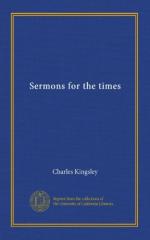Some may say, It is our freedom which makes us strong. My friends, believe it not. Freedom is a vast blessing from God, but freedom alone will preserve no nation. How many free nations have fallen into every sort of misery, ay, into bitter slavery, in spite of all their freedom. How many free nations in Europe lie now in bondage, gnawing their tongues for pain, and weary with waiting for the deliverance which does not come? No, my friends, freedom is of little use without something else—and that is loyalty; reverence for law and obedience to the powers that be, because men believe those powers to be ordained of God; because men believe that Christ is their King, and they His ministers and stewards, and that He it is who appoints all orders and degrees of men in His Holy Church. True freedom can only live with true loyalty and obedience, such as our Prayer-book, our Catechism, our Church of England preaches to us. It is a Church meant for free men, who stand each face to face with their Heavenly Father: but it is a Church meant also for loyal men, who look on the law as the ordinance of God, and on their rulers as the ministers of God; and if our freedom has had anything to do (as no doubt it has) with our prosperity, I believe that we owe the greater part of our freedom to the teaching and the general tone of mind which our Prayer-book has given to us and to our forefathers for now three hundred years.
Not that we have listened to that teaching, or acted up to it: God knows, we have been but too like the Jews in Isaiah’s time, who had the Law of God, and yet did every man what was right in his own eyes; we, like them, have been hypocritical; we, like them, have neglected the poor, and the widow, and the orphan; we, like them, have been too apt to pay tithe of mint and anise, and neglect the weightier matters of the law, justice, mercy, and judgment. When we read that awful first chapter of Isaiah, we may well tremble; for all the charges which he brings against the Jews of his time would just as well apply to us; but yet we can trust in the Lord, as Isaiah did, and believe that He will be jealous for His land, and for His name’s sake, and not suffer the nations to say of us, ’Where is now their God?’ We can trust Him, that if He turn His hand on us, as He did on the Jews of old, and bring us into danger and trouble, yet it will be in love and mercy, that He may purge away our dross, and take away all our alloy, and restore our rulers as at the first, and our counsellors as at the beginning, that we may be called, ‘The city of righteousness, the faithful city.’ True, we must not fancy that we have any righteousness of our own, that we merit God’s favour above other people; our consciences ought to tell us that cannot be; our Bibles tell us that is an empty boast. Did we not hear this morning, ’Bring forth fruits meet for repentance: and think not to say within yourselves, We have Abraham to our father; for God is able of these stones to




